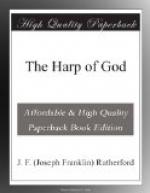[49]When God sentenced our first parents to death and drove them out of Eden, he had in mind and had already planned for their future blessing, as we will see upon a further examination of his plan. Hence it was love that prompted his action in sentencing Adam to die. Every act of Jehovah is prompted by love; for God is love. He always acts that good may result. The manifestation of his strict justice was essential that the dignity and greatness of Jehovah might be maintained. At the same time, in so doing, love was the motive that prompted his action. It must have brought sorrow to the heart of Jehovah to be compelled thus to punish his creatures, because God takes no pleasure in evil things; yet having in mind the ultimate blessing and restoration of them, there would be pleasure in thus manifesting justice that ultimate good might result.
[50]We therefore might with propriety speak of the manifestation of justice as the minor chord in the music of the harp of God. The minor chord seems necessary in music to produce exact harmony.
[51]Job in his suffering seems to picture the world of mankind under condemnation; and when suffering he said: “My harp also is turned to mourning”. (Job 30: 31) The perfect man and his helpmate, deprived now of their perfect home, toiling as they sought to gather their food from the unfinished earth, suffering in body and in mind because of their separation from God, truly would have said, and doubtless did say: ’Our harp is turned into mourning’. Since that time the whole world has been in a state of mourning; and mankind still suffers and groans in pain. The world of mankind in general has not appreciated the manifestation of the justice of Jehovah. The Christian, however, who has come to a knowledge of Jehovah’s plan, and sees and appreciates his purposes for the blessing of mankind, can rejoice and does rejoice at the manifestation of divine justice.
[52]During the gospel age God has been developing a church, the members of which are designated as the body of Christ. (Philippians 1:29; Colossians 1:18) These are also designated members of the royal priesthood. (1 Peter 2:9,10) During their earthly career they are counted as members of the sacrificing priesthood, of which Aaron was a type. Aaron and his sons were required to serve before the Lord in the ceremonies in connection with the tabernacle in the wilderness. Two of Aaron’s sons were stricken dead because they offered strange fire before the Lord. Aaron and his two remaining sons were forbidden by the Lord to mourn the death of their kinsmen. Evidently this is a picture which shows that those who have come to a knowledge of the divine plan do not mourn because God sentenced our first parents to death, but rather that they will rejoice at this manifestation of justice when they understand that it was necessary in order that the great plan of redemption should be carried out as outlined by Jehovah from the beginning. And when we see and appreciate this divine plan we can truly exclaim: “Great and marvelous are thy works, Lord God Almighty; just and true are thy ways, thou King of saints".—Revelation 15:3.




